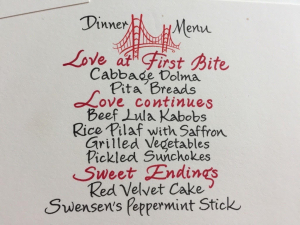1. The RSVP
A regrets-only party is a recipe for disaster. Make sure your invite is clear and that your guests know to RSVP so you can plan ahead versus being left in a bind.
2. Too Many Courses
Three courses are plenty. It’s not a fundraising auction where you want people to stick around to place their bids after one too many cocktails. It’s the holidays; there are a lot of events going on during the month, so think about your guests who will need to pace themselves.
3. Menu
Caviar might be one of your favorites, but it’s a good idea to choose menu items that appeal to the masses. If someone cannot eat an item because they are allergic, the burden falls on them to let you know. However, if they don’t and it happens at the party, plan for those exceptions.
4. Guest List
For a dinner party of six or eight, it’s not necessary. However, if you have a large group, it’s a good idea to keep track of your guests if you need to get a hold of them. Always take seating, place cards, and food allergies into consideration.
5. Guest Details
When they arrive at your home, it’s up to you to take their coat and hostess gift, show them where the bathroom is, where to get a drink, and set them up in conversation with a guest or two. After that, they’re on their own to mix like their chosen cocktail.
6. Planning
Make sure to plan ahead of time (see question 3).
7. Timing
Allow 45 minutes to one hour for appetizers and drinks before serving dinner. Having the food appear on the table too soon doesn’t give people enough time to settle in. Plus, it makes it seem like you want the night to end before it begins. On the other hand, making people wait too long to be served is a sign that you didn’t plan ahead.
8. Place Cards
The holidays are the perfect time to be festive, so get out all those gorgeous place cards, and if it fits in the budget, have the names penned in calligraphy. Etiquette Tip: If the card is tented, write the person’s name on the front and the back of the card. That way the name will be visible from all directions and can act as a non-verbal cheat sheet, especially for people unknown to each other.
9. Seating
Make sure to mix quiet people next to lively guests at the table. Not doing so is a recipe for disaster and can make or break a party. There should always be balance at the table, not only with food but conversation levels.
10. Wrapping Up The Party
At your “designated time” in the evening, stop pouring beverages. This makes the departure easier for everyone. Many people might have children at home with babysitters or have a long distance to drive. As a host, it’s your job to simplify all aspects of the evening.

Nothing says bring on the festivities like themed dinner menus!
